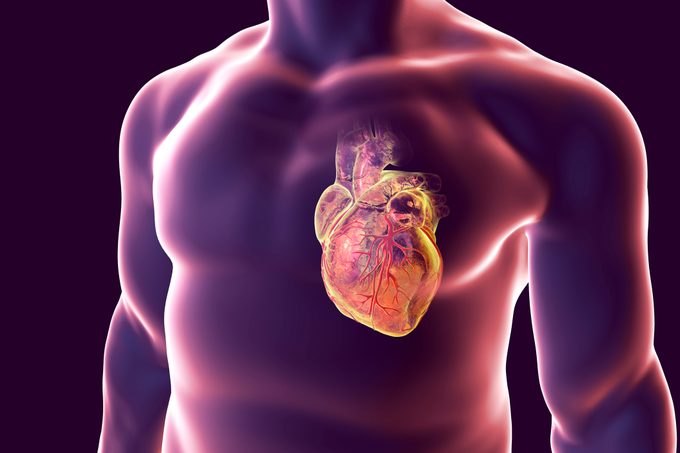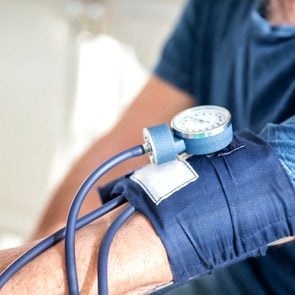Heart Attacks: What Doctors Want You to Know About Symptoms, Treatments, and Causes
Updated: Feb. 10, 2021
Here are the symptoms, treatments, and causes of heart attacks, as well as personal stories from people who've had a heart attack. Lifestyle changes—like diet and exercise—can play a big role in your chance of preventing a heart attack.
Heart disease is the number one killer of men and women in the United States—it kills more people than all cancers combined, and is responsible for one out of every four deaths, according to the Centers for Disease Control and Prevention (CDC). But while 70 percent of Americans say they understand this fact, they still worry more about getting cancer than they do heart disease, according to a 2019 survey of more than 1,000 U.S. adults conducted by private healthcare group MDVIP.
About 80 percent of early heart attacks and strokes are preventable. So when it comes to preventing and surviving heart attacks, having accurate knowledge is everything.
“Heart health education needs to be a top priority in public health,” says Jennifer Haythe, MD, a critical care cardiologist and associate professor of medicine in the Center for Advanced Cardiac Care at Columbia University Irving Medical Center. “Everyone should know the signs of a heart attack, as well as their risk factors and what they can do to prevent one.”
On This Page
What is a heart attack?
A heart attack, also called a myocardial infarction, happens when an artery becomes blocked, often by a blood clot, which cuts off the supply of blood and oxygen to your heart. Heart attacks range in severity. One in five heart attacks are “silent” and you may not even realize you’ve had one (although you can still suffer health problems from it).
The longer your heart is deprived of blood, the more severe the heart attack, with some being fatal. Thankfully, due to improvements in detection and treatment, more than 90 percent of heart attacks are survivable. (Here’s how to tell the difference between cardiac arrest and a heart attack.)
Causes of heart attacks
Most heart attacks are the result of coronary artery disease, where plaque builds up in your arteries over time, eventually narrowing the artery or triggering blood clots that can block the artery. Blood clots can also happen as the result of some diseases, medications, or for unknown reasons.
In rare cases a heart attack is caused by a severe spasm of a coronary artery that stops blood flow to the heart muscle or from a spontaneous coronary artery dissection, which is when a coronary artery wall spontaneously tears, says Dr. Haythe, who is also co-director of the Columbia Women’s Heart Center and director of the Cardio-Obstetric Program.
Risk factors for heart attacks
Your risk of heart disease is determined by a mix of genetic and lifestyle factors, says Amber Khanna, MD, cardiologist at UCHealth University of Colorado Hospital and an associate professor at the University of Colorado School of Medicine. Half of all Americans have at least one of the “big three” risk factors for heart disease: high blood pressure, high cholesterol, and smoking, according to the CDC. (Not every country has this issue though, check out these secrets from countries with the lowest heart attack risk.)
Lifestyle factors play a big role in your chances of having a heart attack but they are also largely under your control, Dr. Haythe says. This includes eating an unhealthy diet, not exercising, drinking too much alcohol, eating too much salt, and taking certain medications.
Some health-related factors increase your risk of heart attacks (or are associated with a higher risk of them), including diabetes, obesity, alcohol abuse disorder, some cancers, insomnia, depression, viral or bacterial infections, chronic kidney disease, inflammatory diseases, and menopause, Dr. Khanna says.
There are risk factors for heart attacks that are out of your control but are still good to know about when it comes to assessing your own personal risk, Dr. Haythe says. These include your family history of heart disease, congenital heart problems, and being older than 60.
It’s difficult to pinpoint all the risks to heart health because they are plentiful and they apply to many health conditions. The important thing is to figure out which things present the biggest risk to you personally and then work with your doctor to come up with an individual heart-health plan, Dr. Khanna says.
Covid-19 as a risk factor for heart attacks
It’s not just a respiratory virus: Covid-19 is full of unpleasant surprises and you can add heart problems to that list. “It is unknown how Covid impacts the rate of heart attacks specifically but we do know that the virus can cause several cardiac complications including inflammation of the heart (myocarditis), abnormal heart rhythms (arrhythmias), and heart failure syndromes,” Dr. Haythe says.
These issues may persist even after you recover, she says. Scientists are still researching the long-term cardiac implications of a prior Covid-19 infection but a 2020 study, published in JAMA, suggests the damage may be significant. Researchers looked at cardiac MRIs of recently recovered Covid-19 patients and found cardiac involvement in 78 percent and ongoing myocardial inflammation in 60 percent, both of which may increase the risk for a heart attack.
They found these complications even in younger patients who reported milder symptoms of the disease and in people who tested positive but were never hospitalized.
So what can you do to mitigate this risk? “The best thing to do is manage all of your cardiac risk factors like diabetes, hypertension, obesity, and cholesterol levels,” she says. “Being healthy to begin with is the best defense.”

Heart attack symptoms
Everyone should know the five most common warning signs of a heart attack, according to the American Heart Association: chest pain or discomfort; light-headedness, nausea or vomiting; jaw, neck, or back pain; discomfort or pain in arm or shoulder; and shortness of breath.
A note about chest pain: It is the most common symptom of a heart attack in both women and men but it’s not necessarily the sudden, clutching-your-chest Hollywood version, Dr. Khanna says. “Any serious, ongoing chest discomfort may indicate a heart attack,” she says. The AHA describes it as “uncomfortable pressure, squeezing, fullness or pain in the center of your chest that lasts more than a few minutes, or goes away and comes back.” You can have a heart attack without feeling any chest pain so don’t depend on this one symptom to know if you’re in trouble.
Less typical symptoms of a heart attack include extreme exhaustion, cold sweats, hot flashes, fainting, tooth pain, muscle weakness, headaches, and a marked decline in your usual levels of endurance, Dr. Khanna says. These may happen suddenly or come on slowly, getting worse over a period of days, weeks, or even months. Pay special attention to these symptoms if they happen in conjunction with any of the AHA’s big five, she adds.
One big risk? Gender. While men and women are equally likely to have a heart attack, women are less likely to seek help during a cardiac event, less likely to receive speedy treatment, and more likely to die of a heart attack than men, according to research, including a 2017 study in the Journal of the American Heart Association. One reason for this is that women are more likely to present with symptoms that are different from those seen in men, which may lead them and/or their doctors to dismiss their symptoms, Dr. Haythe says.
“If you think you are having a heart attack, please go to the hospital or call your doctor. We’d much rather have it be a false alarm than miss a heart attack,” Dr. Khanna says.
How a heart attack is diagnosed
“If you think you’re having a heart attack, call 911, time is of the essence,” Dr. Khanna says. Getting diagnosed quickly is the most important factor in effectively treating a heart attack and preventing further damage to the heart muscle, she says. (Here’s exactly what to do if you think you’re having a heart attack.)
There are two main types of heart attacks: Those in which the artery is only partly blocked and those where it is completely blocked. The type of diagnostic tests and treatments your doctors order will depend on which type you have.
Your doctor may order non-invasive cardiac tests that look for signs of a heart attack using external methods. These may include an electrocardiogram, a chest X-ray, an echocardiogram, cardiac computed tomography (CT scan), an MRI (magnetic resonance imaging), or a thallium stress test.
For a more detailed picture, your doctor also may order cardiac tests that use more invasive, internal methods. These include blood tests and cardiac catheterization, a procedure where a thin hollow tube is threaded from a blood vessel in the arm, groin, or neck to the heart and then injected with dye to make blockages visible on an X-ray.
Treatments for heart attacks
The type of treatment you will receive for a heart attack depends on the type and severity of blockage(s) you have. Treatments range from using medications to dissolve and prevent clots, to many types of heart surgery.
One of the most common treatments is an angioplasty, Dr. Haythe says. This procedure involves inserting a special tube in a blood vessel, usually in the groin, and threading it up your artery to where the heart blockage is. A balloon at the tip of the tube is inflated to widen the blocked area, allowing blood flow to resume. It’s often combined with a stent, a device inserted to prop open your artery and decrease the chance of another blockage. It’s surgery, but it doesn’t require you to be cut open and generally takes less than hour to complete.
A more invasive option is coronary bypass surgery, in which the chest cavity is opened. Doctors use a blood vessel, usually a vein collected from the upper leg, to bypass the coronary blockage and resupply blood to the oxygen-starved area of the heart.
(Here’s what to do if you see someone else having a heart attack.)
Complications of heart attacks
Potential complications from a heart attack can vary widely, from very mild to life threatening, Dr. Khanna says.
The biggest complication from a heart attack is an increased risk of future heart problems, including heart arrhythmias, chest pain (angina), heart failure (a chronic condition in which the heart is enlarged and struggles to pump blood), cardiogenic shock, and heart rupture. About 20 percent of people who have had a heart attack will have a second heart attack within five years.
Other complications are often related to the type and extent of damage to your heart muscle, she says. This may include things like dizziness, fatigue, and breathlessness. You may also suffer mental health complications from the experience of the heart attack, like depression, anxiety, PTSD, and panic attacks.
(Make sure you know these 12 things to do after you’ve had a heart attack, to help prevent complications.)
Heart attack prevention
About 80 percent of heart events can be prevented and this is mostly done through lifestyle interventions, Dr. Haythe says. Taken together, these interventions create a heart-healthy lifestyle that can improve not just your cardiac health but your health overall. You should try to eat a heart-healthy diet, get regular exercise, reduce stress, quit smoking, limit alcohol consumption, treat mental illness, and maintain a healthy weight, she says.
Medical interventions can also help prevent heart attacks. These include taking a daily baby aspirin and medications to lower cholesterol or blood pressure, as well as managing diabetes or other underlying health conditions. You should also get regular health checkups and heart screenings, Dr. Khanna says. However, you have to combine these with lifestyle changes to see the best effect, she adds.
Personal stories
To find out what it’s really like to have a heart-related health problem, check out these stories from people who had either a heart attack or other condition, such as heart failure.
- This Man’s “Cold” Turned Out to Be a Massive Heart Attack
- The Most Important Thing I Did After My Heart Attack
- My Asthma Turned Out to Be Chronic Heart Failure
- This Woman Was 35, Healthy, and Pregnant Until a Heart Condition Threatened Her Life
- My Flu Symptoms Almost Lead to Heart Failure
- I Thought I Needed a Nap. Turns Out, I Was Having a Heart Attack
Helpful products
If you’re trying to prevent or recover from a heart attack, or just improve your heart health in general, here are some products that may help you live a longer, healthier, and happier life.
- 11 Health Gadgets That Could Save Your Life
- 17 Natural Remedies For High Blood Pressure
- 20 Foods That Can Help Prevent Clogged Arteries
- The Foods Nutritionists Always Buy on Amazon
- 15 Best-Selling Heart-Healthy Cookbooks
- 10 Top-Rated Items For Your Home Emergency Kit
Additional resources
To learn more about heart disease, how to prevent it, treat it, and recover from it, check out these groups.
- The American Heart Association
- Centers For Disease Control and Prevention
- The World Health Organization
- Go Red For Women
Share Your Story
Have you suffered from a heart attack or heart disease? We’d like to hear about your experience afterward. At The Healthy, we believe that sharing your knowledge and experience about a personal health issue or challenge can take you one step closer to feeling better about or solving that issue for yourself. You can use this link to share your own experience and thoughts regarding heart attacks.
We may use your story in future content that may help other people who have had a heart attack or heart disease. We want to know about your experience. So if you have tips and advice, bring it on! And if it helps to tell your story, please submit a photo that we could share with other people.


















